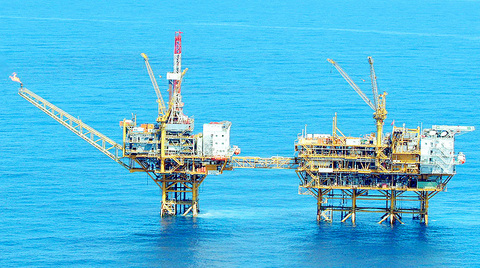Japan said yesterday that China has started production of gas or oil in a disputed energy field in the East China Sea where Chinese warships were recently spotted, and it would consider countermeasures.
Japanese officials have spotted flames spouting out of a Chinese drilling facility just on China's side of what Japan says is a dividing line in the potentially lucrative field. China does not recognize the line.
"We are not sure whether it is oil or gas. But we have confirmed that they have finally started digging," Economy, Trade and Industry Minister Shoichi Nakagawa told a news conference.

PHOTO: AFP
"The government is coordinating to consider ways to deal with this. The facility is located in the area of the dispute, although it is not clear whether the gasfield crosses the median line," he added.
Japan says that China, even if it digs from its side, could extract Japanese resources underground. It wants an agreement between the two countries before either starts extraction.
China and Japan, whose relations have worsened this year, have repeatedly protested to each other over the disputed field. But a series of high-level meetings has led to no agreement other than to continue dialogue.
In Beijing foreign ministry spokesman Qin Gang (
Qin told reporters that China's East China Sea drilling was within its rights.
"China's exploration in the gas field is being conducted in uncontested waters," he said.
However, Qin said, China was willing to conduct talks with Tokyo on the drilling question.
"The principle of the Chinese side is that we hope that the issue between China and Japan in the East China Sea can be handled by dialogue and negotiation," he said.
Nakagawa said he hoped Japan and China would resume dialogue on the issue. Qin said only that arranging the next round "requires further contact and consultations by the two sides."
Japan said Chinese warships were seen near the gasfield for the first time on Sept. 9, two days before Japan's general election. China said they were on a routine drill.
China began test-drilling unilaterally in the East China Sea in 2003. Japan accuses Beijing of reaching into Tokyo's exclusive economic zone, and in July the government for the first time granted a Japanese firm permission to explore the area.
A Japanese survey in 1999 estimated that the disputed field held a massive 200 billion cubic meters of gas.
The gas dispute stems from a disagreement over which sea resources the two sides can claim in the East China Sea, which separates China's eastern coast and Japan's southern island chain of Okinawa.
Under the UN Convention on the Law of the Sea, coastal countries can claim an economic zone extending 200 nautical miles (370km) from their shores. Both Japan and China signed the treaty, but the UN has until May 2009 to rule on the claims.
China also bases its claim on a separate international treaty that lets coastal countries extend their borders to the edge of the undersea continental shelf.
Japan and China, two of the world's biggest energy importers, have also clashed over securing priority to an oil pipeline being built in Russia.

PRECARIOUS RELATIONS: Commentators in Saudi Arabia accuse the UAE of growing too bold, backing forces at odds with Saudi interests in various conflicts A Saudi Arabian media campaign targeting the United Arab Emirates (UAE) has deepened the Gulf’s worst row in years, stoking fears of a damaging fall-out in the financial heart of the Middle East. Fiery accusations of rights abuses and betrayal have circulated for weeks in state-run and social media after a brief conflict in Yemen, where Saudi airstrikes quelled an offensive by UAE-backed separatists. The United Arab Emirates is “investing in chaos and supporting secessionists” from Libya to Yemen and the Horn of Africa, Saudi Arabia’s al-Ekhbariya TV charged in a report this week. Such invective has been unheard of

US President Donald Trump on Saturday warned Canada that if it concludes a trade deal with China, he would impose a 100 percent tariff on all goods coming over the border. Relations between the US and its northern neighbor have been rocky since Trump returned to the White House a year ago, with spats over trade and Canadian Prime Minister Mark Carney decrying a “rupture” in the US-led global order. During a visit to Beijing earlier this month, Carney hailed a “new strategic partnership” with China that resulted in a “preliminary, but landmark trade agreement” to reduce tariffs — but

SCAM CLAMPDOWN: About 130 South Korean scam suspects have been sent home since October last year, and 60 more are still waiting for repatriation Dozens of South Koreans allegedly involved in online scams in Cambodia were yesterday returned to South Korea to face investigations in what was the largest group repatriation of Korean criminal suspects from abroad. The 73 South Korean suspects allegedly scammed fellow Koreans out of 48.6 billion won (US$33 million), South Korea said. Upon arrival in South Korea’s Incheon International Airport aboard a chartered plane, the suspects — 65 men and eight women — were sent to police stations. Local TV footage showed the suspects, in handcuffs and wearing masks, being escorted by police officers and boarding buses. They were among about 260 South

Chinese President Xi Jinping’s (習近平) purge of his most senior general is driven by his effort to both secure “total control” of his military and root out corruption, US Ambassador to China David Perdue said told Bloomberg Television yesterday. The probe into Zhang Youxia (張又俠), Xi’s second-in-command, announced over the weekend, is a “major development,” Perdue said, citing the family connections the vice chair of China’s apex military commission has with Xi. Chinese authorities said Zhang was being investigated for suspected serious discipline and law violations, without disclosing further details. “I take him at his word that there’s a corruption effort under